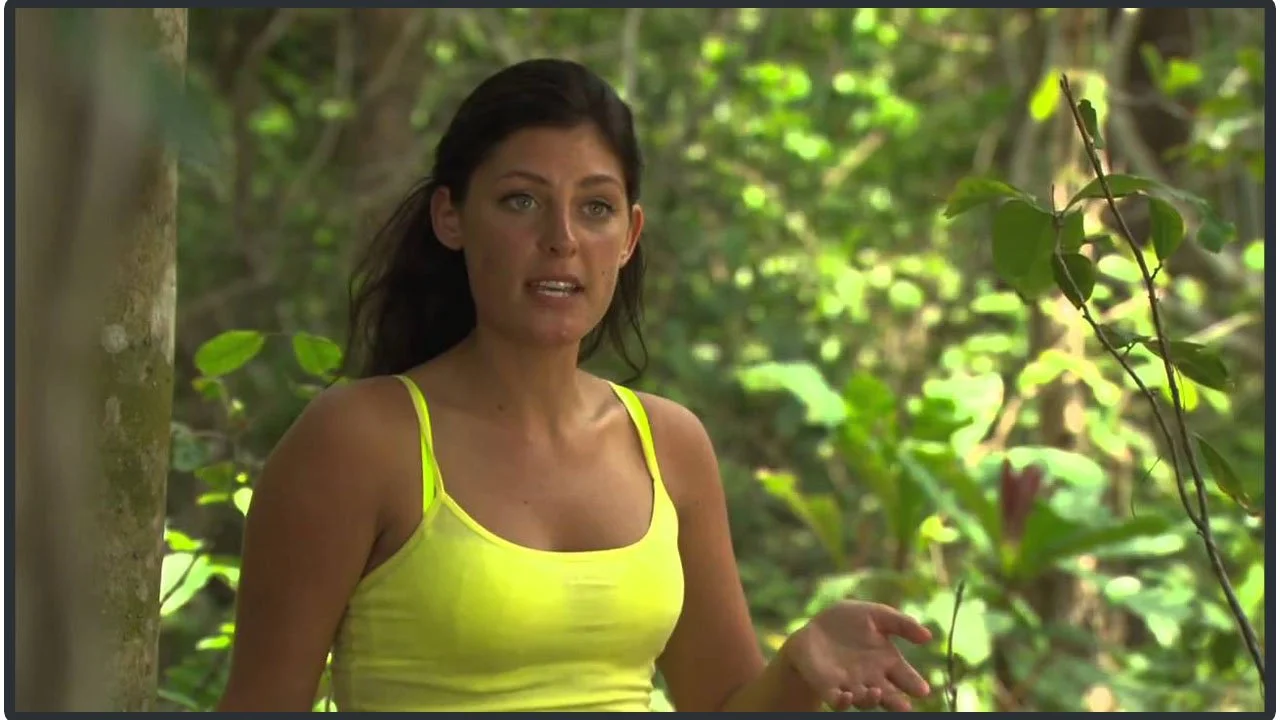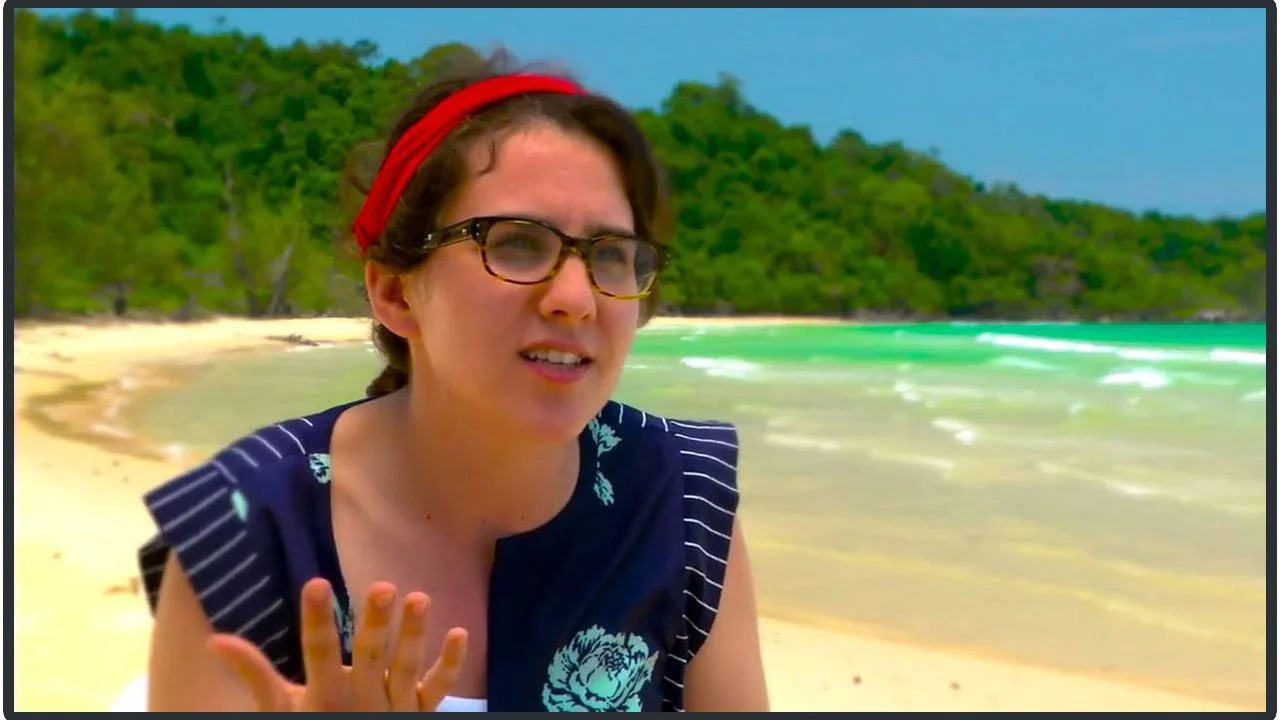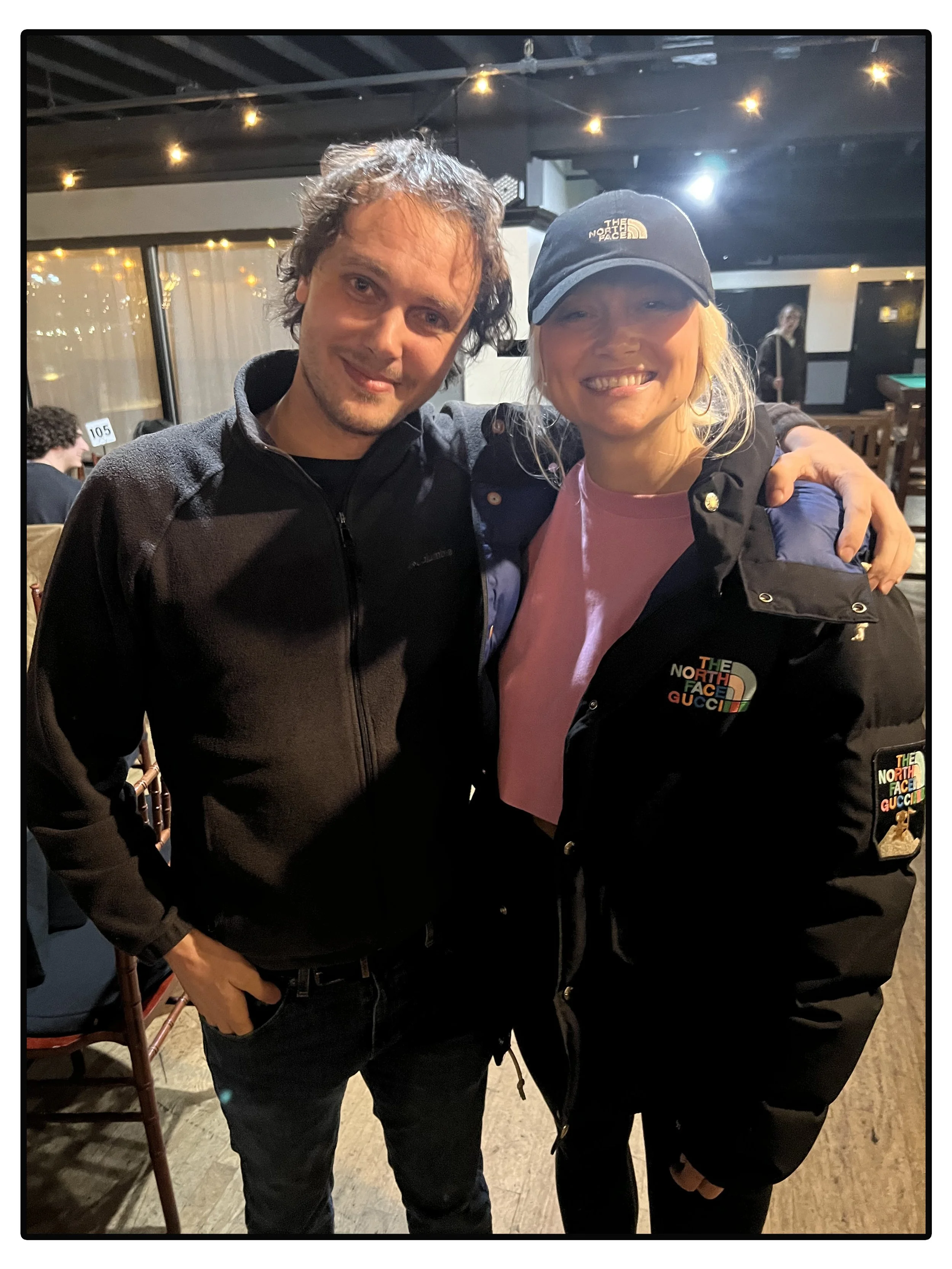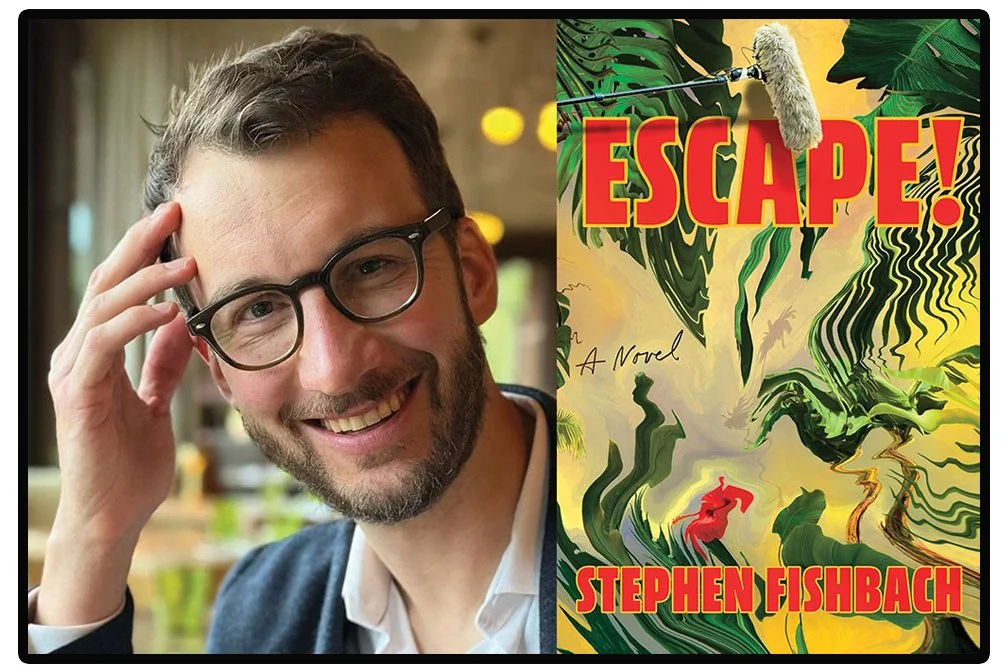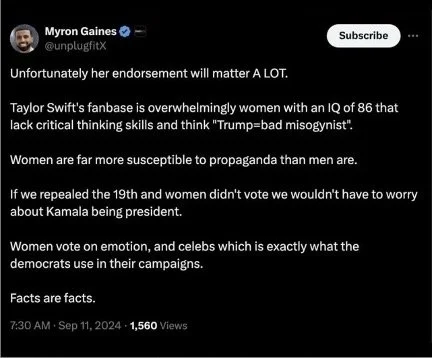FAQ for Literary Agents
Q: What inspired you to write The Laws of Vanity?
A: The Laws of Vanity was inspired by a season of the reality TV show Survivor. Specifically, it was inspired by the show’s thirty-second season entitled Survivor: Kaôh Rōng — Brains vs. Brawn vs. Beauty.
This season has become infamous due to its controversial ending. By the time the final episode of the season aired on May 18, 2016, the vast majority of the show’s viewers believed that Aubry Bracco, the Brown-educated social media marketing strategist who began her journey on the Brains tribe, had played the best game of all the remaining competitors and deserved to be the winner. However, the jury of previously-eliminated contestants voted to give the win to the Beauty tribe’s Michele Fitzgerald, a New Jersey-based bartender who impressed her fellow competitors with her challenge victories and strong social game.
Michele Fitzgerald
Inspiration for Courtney Suveau
Aubry Bracco
Inspiration for Gwen Bressly
The jury’s decision to crown Michele Fitzgerald as Sole Survivor was highly unpopular among the majority of the fans, who believed Aubry Bracco should have been chosen as the winner. Fans were quick to accuse the jury of displaying sexist behavior by showing bitterness over being outsmarted by a woman, and to accuse the jury of treating the game as a petty popularity contest.
Despite the chaos that flooded the internet in the immediate aftermath of the season, both Fitzgerald and Bracco spoke positively about each other, not falling into the divisive rhetoric that was consuming the fans. I thought there was something very inspiring about the mutual respect and admiration they had for one another, and as I looked back over the events of the season, I realized there was a great story that fans had overlooked. At its core, the story of the season was about two women who are judged by stereotypes associated with their appearances in their day-to-day life, who are now thrust into this competitive environment that further segregates them by their appearances, who are then ultimately able to work together and form a lasting bond that was strong enough to survive the onslaught of negativity that surrounded them by the end of their journey.
Once I realized there was so much untapped potential in this story, I decided to write The Laws of Vanity, a novel that takes certain events from the game and translates them into real world situations in modern day Los Angeles. My goal was to retell their story in a way that highlighted the overlooked positive elements of their journey, thus giving Michele Fitzgerald and Aubry Bracco a second chance at a better legacy.
To be clear, it is NOT REQUIRED for anyone to have any prior knowledge of Survivor in order to follow the plot of my novel. The Laws of Vanity was written in such a way that it functions as a self-contained story.
For a more detailed summary of my novel’s origins, you can click HERE.
Q: Do you have a plan to market this book?
A: YES! As previously stated, my book is directly based on the events that took place on a season of Survivor, a show that has been on the air since 2000 and continues to see high viewership numbers to this day. This means there is already an established group of people who are familiar with the subject matter of my book and would be interested in reading more. As previously stated, prior knowledge of Survivor is not required to understand my novel, but anyone familiar with the show’s history will have extra incentive to seek out my novel since it will tap into something they are already invested in.
The story, however, does not stop there…
On October 30th, 2024, I attended a Survivor watch party at the Xtadium nightclub in Seattle hosted by Kelley Wentworth, a three-time competitor on the show with an Instagram following of over 82,000. Wentworth also hosts the “On The Edge,” podcast, a weekly podcast which covers episodes of the show and various other Reality TV-related news.
I told Wentworth about my novel during the watch party and asked if she wanted to read my novel. When she accepted, I sent her my full manuscript. Since we last spoke, she is halfway through finishing, and she says she has really enjoyed it. She told me that if my novel ever gets published she would be willing to bring me on her podcast to talk about my novel to help me reach potential readers within her viewer base who are already invested in the premise.
While this is a single interview, there are many other podcast hosts to whom I could reach out so they can discuss my novel with their own audience. The exposure I will get from the initial interview with Wentworth would be the catalyst I need to be featured on other channels. I’ve curated a list of other shows/podcasts that I can reliably reach out to once I reach that phase:
The Survivor Know-it-Alls
The Survivor Specialists
The Purple Rock Podcast
Brink of Reality
Purple Pants Podcast | Brice and Wen Present
To summarize, the fact that I’m tapping into a pre-existing fanbase puts me at a significant advantage over other up-and-coming writers who will struggle to find readers for their debut novel. The Survivor origins in conjunction with my partnership with Kelley Wentworth will create a snowball effect unlike anything you have seen from any of your newer clients. Once we secure a contract with a publishing house, there is no doubt I will be able to sell my novel.
UPDATE: On January 28th, 2026, two-time Survivor contestant Stephen Fishbach (Seasons 18 and 31) published his debut novel Escape! which was heavily inspired by his own experiences in reality television. Due to his existing network of fans and supporters within the community, his book was able to become a USA Today bestseller in less than a month. It is currently February 14th, 2026 as I am writing this and his bestseller status remains verified. If word gets out that I have written a novel based on the infamous Michele vs. Aubry controversy from Season 32, it will generate buzz and excitement within this same network of fans. While I obviously cannot promise bestseller status (nobody can), I have a legitimate path to spread news about my novel within a community that is already engrossed in my novel’s subject matter, giving me a huge advantage most newcomer authors will not have.
Q: Why are you the right person to write this book?
A: I have often been asked why I am the right person to tell this story, considering that I am a young white man who has written a novel featuring two female characters who are battling issues related to body dysmorphia, media scrutiny, sexualization, and eating disorder. It’s a valid question, and probably a main source of concern among literary agents who are unsure if they want to take me on as a client. I’ve outlined four points to address these concerns, which I humbly request that you read before making any assumptions about me:
1) I Have Been Told by Female Editors That I Do a Great Job at Writing Female Characters
I have only ever worked with female writers and editors while working on my novel. Some of my editors include Christine Webb (Author Accelerator), Ciara Duggan (Book Pipeline), and the one and only Alyssa Matesic. I also enlisted Isabelle Felix as a sensitivity reader. All of the women I have collaborated with have told me I do an excellent job of writing female characters and that I avoid the usual pitfalls many male authors fall into by mistake. I approach female characters the same way I approach male characters, which is to focus on their goals, desires, and limitations and explore the obstacles they have to overcome to achieve what they want. I believe this approach will allow me to write female characters that feel authentic and grounded instead of having them be portrayed as mouthpieces.
2) The Stakes Are Higher With Female Characters
In our society, there is a greater pressure for women to look glamorous and conventionally beautiful in order to have a thriving career in the film and fashion industries. A 2023 article by Melissa Robertson outlined that the median age for male actors is 61.3 while the median age for female actors is 39.8. Women make up roughly one-third of all actors in the industry while men comprise the remaining two-thirds, resulting in approximately 80% of films featuring more male actors than female actors (Robertson, 2023).
There is a growing necessity for women to be young and beautiful in order to achieve a thriving career in the film industry before they are seen as being “past their prime.”
If I were to rewrite The Laws of Vanity with Courtney and Gwen as male characters, the story itself would suffer from lower stakes and reduced drama because there wouldn’t be as much pressure forced onto them by their environment.
3) I Am a Part-Time Model and a Client of a Talent Agency
In 2021, I was accepted into a Seattle-based talent agency for aspiring models and actors. In 2024, I began working as a freelance art model, and I have posed for various sculpting, sketching, and painting classes. Furthermore, I was born with a rare chest deformity called Pectus Excavatum that causes my chest to bend inwards near the spot where my sternum is.
As a male model with a chest deformity, I have experienced tremendous fluctuation in my self confidence and my body image that lends itself to the insecurities faced by both Courtney and Gwen in my novel. Furthermore, my experiences with modeling and attending acting auditions has given me the knowledge I need to create an accurate portrayal of these industries in my writing.
4) I Can Make Feminist Themes More Appealing to Men; Diversify Readership
In today’s hyper-polarized political climate, young men are becoming increasingly distant from social issues and have become far more comfortable in venting their frustrations with the rise of female representation in media. Andrew Tate, a self-proclaimed misogynist influencer, has accumulated over 10 million followers on Twitter/X despite having been charged with rape, sexual exploitation, and human trafficking. Myron Gaines, host of the Fresh & Fit podcast, has also achieved legions of followers across YouTube and other social media platforms where he criticizes feminist culture and encourages other men to assert dominance in their relationships.
On February 10, 2025, Melissa Deckman published an Op-Ed on The Hill outlining that Gen-Z men voted for Donald Trump largely due to an increasing rightward shift in young men caused by a growing fear that feminism and DEI policies will exclude them from employment opportunities (Deckman, 2025). Such concerns have also caused men to gravitate towards far-right “manosphere” influencers like the aforementioned Andrew Tate and Myron Gaines in a misguided effort to regain their masculinity.
On March 21, 2025, Jacob Savage wrote a piece for Compact Magazine entitled The Vanishing White Male Writer, in which he reports on the declining statistics of caucasian men who receive nominations for various literary awards (Savage, 2025). Far-right conservative influencer Charlie Kirk of TPUSA cited this article as a justification for young men’s increasing disillusionment with liberal ideology, fanning the flames of his radical base.
To summarize, young men are becoming dangerously radicalized in today’s political climate and are more convinced than ever that they are being ostracized and discriminated against by these institutions. As a young man in his late twenties who has written a novel centered around two dynamic female characters, I can help set an example for young men that being able to empathize with women and relate to their struggles is not a sign of weakness but a sign of strength and healthy masculinity.
Hypothetically, if I were a woman who wrote this exact same book word for word, I fear it would result in a “preaching to the choir” effect, where I would be writing exclusively for readers who fall into my own gender and age demographic that already agree with my themes and messages. However, as a young man writing a novel of this subject matter, I can make the feminist themes more accessible to a wider audience and make the story more appealing to male readers who would ordinarily never consider reading it at all. This would result in a novel that would still appeal to its core demographic while opening the door for other readers who would be more likely to give it a chance.
In today’s hyper-polarized political climate where men are becoming increasingly antagonistic towards women for the sake of bolstering their own egos, I believe the publishing industry should help set a positive example for young men by encouraging them to read more books about strong, empowered women. A male author attached to such a novel could serve as the proverbial Trojan Horse that may help turn the tides on this rapidly growing dilemma in our society.
CITATIONS
Canfield, D. (2025). How Mike White’s history with ‘Survivor’ unlocks The White Lotus. Vanity Fair. https://www.vanityfair.com/hollywood/story/mike-white-survivor-white-lotus
Deckman, M. (2025). Gen Z men’s rightward shift is happening, but could be temporary. The Hill. https://thehill.com/opinion/campaign/5134296-gen-z-men-voting-trump/
Robertson, M. (2023). Mind the gender age gap: where are the ‘woman of a certain age’ in Barbieland and beyond? Shots Magazine. https://magazine.shots.net/news/view/mind-the-gender-age-gap-where-are-the-woman-of-a-certain-age-in-barbie-land-and-beyond
Savage, J. (2025). The vanishing white male writer. Compact Magazine. https://www.compactmag.com/article/the-vanishing-white-male-writer/
USA TODAY’S Best-selling Booklist February 4th, 2026. https://www.usatoday.com/booklist/genre/fiction/date/2026-02-04
